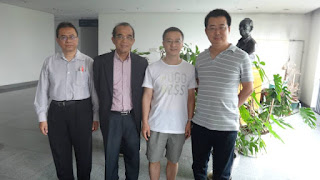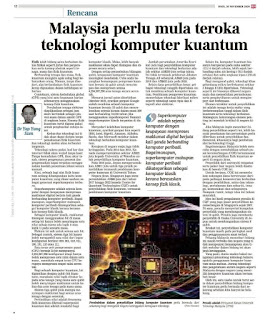This weekend, I was occupied with evaluating BSc physics students dissertations for their final year projects. With everything given electronically, I had to face the computer for long periods, aggravating my ailment. I was struggling with my back pain all weekend that had both my legs weakened a little. Took pain killers and with my current sleep disorder, it had me sleeping much.
I remembered my final year project in Adelaide. We were given a list of topics for us to consider from potential supervisors among the four permanent academic staff of the Department of Mathematical Physics (no longer in existence). I chose something on Grand Unification Theory. The dissertation I wrote was "Minimal SU(5), Modifications and Related Topics". There was another student (a close friend of David Hartley that I've forgotten the name) who also took the grand unified theory theme but he was working on E_6, if I'm not mistaken. Remembered how he bragged about his theory is more difficult than mine but I took that as a friendly joke. My project was to review the minimal SU(5) grand unification and I focused on two main problems of this unified theory, namely fermion masses and proton decay. For both problems, I reviewed the use of higher dimensional Higgs multiplets (would eventually also produce more Higgs particles) and the use of effective field theories. Using higher-dimensional Higgs allows one to have more parameters in the theory enough to tweak out the right (order of) answers. Effective field theories are a little bit more difficult but the fact that the Planck mass scale is already close to the unified mass scale helps modify the fermion masses but not so for proton decay. For proton decay, however, one has to cook up some form of family interactions (interactions between the different generations of quarks and leptons). My main reference to my review is Paul Langacker's Physics Reports article, "Grand Unified Theories and Proton Decay" and numerous articles of John Ellis. I was happy to be able to hear John Ellis live in Singapore some years ago - kind of my hero during my undergraduate days. Due to this project, it spurred my interest in supersymmetry and supergravity thereafter, continuing with the unification theme, but now with less parameter fiddling. Started to read then Peter van Nieuwenhuizen's Physics Report article "Supergravity". It was fun then to do the project, getting me to the frontier topics.
However what I did then (going to real frontier topics of theoretical physics), cannot really be applied to theoretical physics final year project here. This is due to the huge gap between what was taught in our undergraduate syllabus and research-level topics for theoretical physics. Much of my earlier attempts was to introduce some standard topics in theoretical physics that was not taught here - the favourite topic chosen has been usually black holes and variants (like wormholes), I'm not sure why. It didn't really quite work to what I actually wanted and there are risks of students simply parroting what is found in articles. When I joined the institute, I stopped taking final year project students much due to preoccupation with administrative duties and research postgraduates. Also the understood terms of agreement (then) when one is borrowed by the institute is that one only do one subject of teaching.
It take me several years to think what is best formula for theoretical physics final year projects, given our present curriculum. They can't really compete with their experimental colleagues who tend to explore experiments with various new materials. Since the final year project is meant to impart some basic research skills, they need to properly do the calculations of the materials suggested to them (as opposed to simply accepting the equations). In some ways, this has been implemented. The thing I hope they can get to do is to make a pedagogical review of their final year research topic in a way accessible to their colleagues in other groups. I have always suggested to them to look into articles published by American Journal of Physics or European Journal of Physics or Contemporary Physics for their pedagogical approach. For me what makes their dissertations of value is that it help others to learn the subject. Their work will not be read by researchers in the corresponding field. (There are exceptions of course. See for instance https://scholar.rose-hulman.edu/rhumj/. The mathematics department at Roseman-Hulman Institute recently won a 2021 AMS award for exemplary program). Thus, it does not make sense for them to write the dissertation's content as if they are writing them for a research journal. If so, most probably, it will not be read by anyone apart from themselves and their close friends. Thus for me, this would be my requirement and writing a pedagogical dissertation for an advanced topic is not easy and requires talent, which I hope will be nurtured through these exercises. Who knows they can hone these skills to be a good science communicator in the end, if not high flying researchers.
One of the obstacles for nicely written pedagogical treatise is their language skills (and this need not be necessarily just the English; the Malay abstract is often not that well-written either). There is no short-cuts in acquiring good language skills but one has to read and write more. Sometimes it can be frustrating that instead of playing the role of a supervisor or an independent evaluator, one got stuck to be a language editor. Sometimes it can be so bad that the scientific content got misrepresented. There are two books I highly recommend for students to read:
- Sir Ernest Gowers, "The Complete Plain Words"
- Robert A. Day, "How to Write & Publish a Scientific Paper"

































